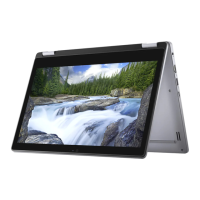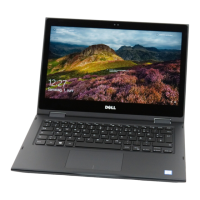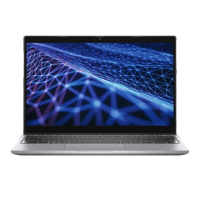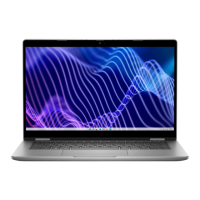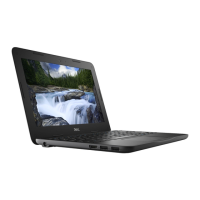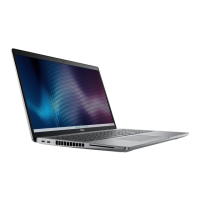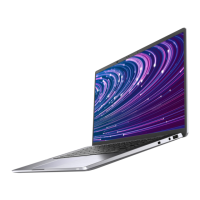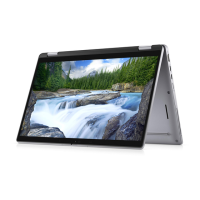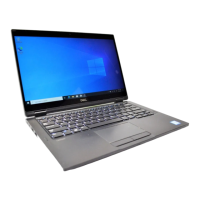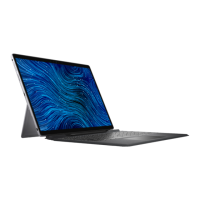Do you have a question about the Dell Latitude 3310 2-in-1 and is the answer not in the manual?
Instructions on connecting the power adapter and turning on the computer for initial setup.
Guidance on completing the operating system setup process after initial power-on.
Recommendations for finding and utilizing pre-installed Dell applications for system management.
Identifies and describes components visible on the front of the laptop.
Details the ports and connectors located on the left side of the laptop.
Outlines the ports and connectors found on the right side of the laptop.
Illustrates and labels components on the bottom surface of the laptop.
Shows and describes components on the palm rest area, including the keyboard and touchpad.
Comprehensive guide to function key combinations for multimedia and system controls.
Provides physical measurements and weight specifications for the laptop.
Lists available processor options, including core count, speed, and cache.
Details the chipset used, processor compatibility, and bus specifications.
Lists supported operating systems for the Latitude 3310 2-in-1.
Specifies memory slots, type, speed, and supported configurations.
Enumerates external and internal ports and connectors available on the device.
Details wireless module specifications, including model, standards, and encryption.
Describes audio controller, speaker specifications, and microphone details.
Outlines supported storage types and interface specifications.
Specifies the type of media card reader and supported card formats.
Details keyboard type, layout, number of keys, and shortcut key functionality.
Provides specifications for front and world-facing cameras, including resolution and viewing angles.
Lists touchpad resolution specifications and links to gesture information.
Specifies power adapter type, input/output voltage, and operating temperature.
Details battery type, voltage, weight, dimensions, and temperature ranges.
Provides specifications for the display, including panel technology, resolution, and brightness.
Lists integrated graphics controller, external display support, and memory.
Specifies operating and storage conditions like temperature, humidity, and altitude.
Explains how to access the one-time boot menu for device selection and diagnostics.
Details the keyboard keys used for navigating within the System Setup menus.
Overview of general system settings, including system information and boot sequence.
Covers system information, memory configuration, processor details, and device information.
Options for configuring SATA operation, drives, USB, audio, and touchscreen settings.
Settings related to display adjustments, such as LCD brightness and switchable graphics.
Options for setting administrator and system passwords, and configuring security features.
Configuration options for enabling and managing Secure Boot features.
Settings for securing code execution and sensitive information using Intel SGX.
Options to optimize system performance, including multi-core support and Intel SpeedStep.
Settings for managing power consumption, including AC behavior and wake-up options.
Configuration for POST (Power-On Self-Test) behavior, warnings, and MAC address passthrough.
Options to enable or disable virtualization technologies like VT for Direct I/O.
Controls for enabling or disabling wireless devices like WLAN and Bluetooth.
Options for system maintenance, including service tag, data wipe, and BIOS recovery.
Tools for viewing and clearing system events like BIOS, thermal, and power events.
Settings for automatic OS recovery and troubleshooting using Dell SupportAssist.
How to change the order of devices used for booting the system.
Procedures for updating the system's BIOS firmware.
Step-by-step guide to updating BIOS using the Windows operating system.
Information on updating BIOS for Linux and Ubuntu operating systems.
Method for updating BIOS via a bootable USB drive in Windows.
Process for updating BIOS using the F12 boot menu option.
Information on setting and managing system and setup passwords for security.
Detailed steps for creating or assigning a new system or admin password.
Instructions for modifying or removing existing system and setup passwords.
Lists the supported operating system for the device.
Guide on creating a USB recovery drive for troubleshooting Windows issues.
Steps for finding and downloading necessary drivers for Windows.
Lists resources for obtaining information and support for Dell products.
Information on how to reach Dell for sales, technical support, or customer service.
| Storage | Up to 512GB SSD |
|---|---|
| Operating System | Windows 10 Pro |
| Camera | 720p HD Webcam |
| Processor | 8th Generation Intel Core i5-8265U |
| Display | 13.3-inch FHD (1920 x 1080) Touch Display |
| RAM | Up to 16GB DDR4 |
| Graphics | Intel UHD Graphics 620 |
| Battery | 3-Cell 42WHr Integrated Battery |
| Ports | 2 x USB 3.1, 1 x USB-C, HDMI 1.4, microSD card reader, headphone/microphone combo jack |
| Wireless | Intel Dual Band Wireless-AC 9560 802.11ac 2x2 + Bluetooth 5.0 |
